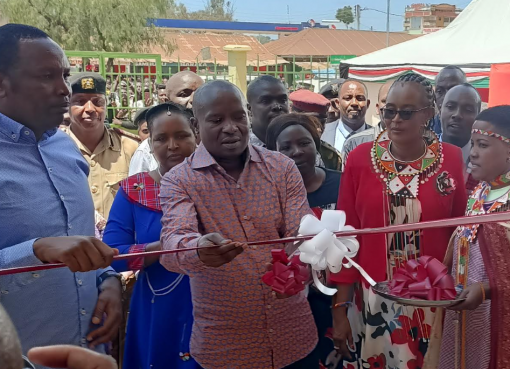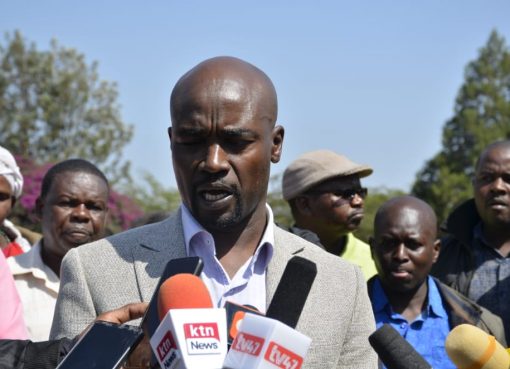The Centre for Mathematics, Science and Technology Education in Africa (CEMASTEA), has stepped-up efforts aimed at addressing underperformance in STEM-related subjects in secondary schools in the country.
The ambitious programme seeks to upscale the teaching of Science, Technology, Engineering and Mathematics (STEM) subjects in secondary schools, as part of the government’s initiative towards vision 2030.
The initiative is being spearheaded by CEMASTEA, a State Corporation under the Ministry of Education.
The State Corporation is carrying out an outreach and mentorship programme to motivate and inspire students to pursue STEM subjects in secondary schools and tertiary institutions.
Speaking during the close of a one-week outreach programme at Shitoli Secondary School, CEMASTEA National Trainer Clotilda, Nyongesa Murambi, said the use of models and play based learning helps to remove the stereotypes that sciences are meant for a particular group.
“We stir them up for STEM for gearing towards the 4th industrial revolution and also just changing the world around us. When they engage with the apparatus and the experiments even girls know that gender is not an issue, that regardless of your background you can understand the STEM Subjects,” she noted.
She explained that the programme is based on a survey carried out by the Ministry of Education that revealed that candidates in secondary schools have continued to underperform in science related subjects in national examinations over the years.
The research, conducted in 2016, in selected 102 secondary schools revealed a high rate of underperformance in science and mathematics subjects.
It is further revealed by other studies that only 22 per cent of Kenyan university students pursue courses in STEM subjects compared to 70 per cent in Asian Tiger countries like South Korea and Singapore.
The STEM activities are premised on students taking-up mathematics and science related subjects and pursue STEM-related courses in tertiary education and is geared towards promoting learner-centred lessons for effective implementation of the curriculum.
“It also aims at enhancing the attitude of the school administration, teachers and students of these schools towards mathematics, physics, chemistry and biology subjects,” said CEMASTEA National Trainer, John Odhiambo.
According to Dr. Karanja Mutito, a National Trainer with CEMASTEA, the STEM subjects are envisioned in the Competency Based Curriculum.
“Let the teachers develop the concepts by involving learners in the various activities which will enhance good perception and performance of STEM subjects,” he noted.
Many teachers and students welcomed the training, saying the adoption of the theory-to-practice approach was necessary in making the teaching of sciences interactive and ensuring retention of knowledge to learners.
The Science subjects’ teachers said they have been exposed to many concepts and models that have simplified the techniques of teaching and helped enhance students’ interest in the science subjects.
Jones Mwando, a science teacher at St. Patrick’s Ikonyero Secondary School lauded CEMASTEA for enhancing the capacity of science teachers and helping in transforming the perception of learners.
Mwando opined that through the mentorship programme, she has been able to learn innovative teaching strategies that will impact significantly on students’ academic performance.
“The trainers have simplified teachings of some of the topics by using various models and this has been able to change the attitude and misconception of some students that science subjects are difficult,” she said.
She also hailed the practical innovations that the learners have been exposed to, which has made learning of the science subjects interesting and ensuring retention of knowledge to the learners.
“The negative attitude towards sciences is likely to change with this kind of exposure,” she added.
She noted that many schools are constrained with lack of laboratory facilities, but added that some of the innovations they have been exposed to will go a long way in building their capacity.
Eugene Lugisa, a form two student from St. Patricks’ Ikonyero Secondary School, said he had changed the negative perception about physics and robotics, after the trainers simplified some of the concepts.
Isabella Makanzi and Elias Mutende, both teachers of science subjects at Kilimo girls secondary school said the emphasis of the trainers on use of visual aids in teaching science was vital in ensuring retention of knowledge by learners.
“Visual aids help the learner in remembering concepts and enhancing their memory” said Makanzi.
On her part, Mutende said from the CEMASTEA outreach programme he has been able to gain the knowledge of being innovative and exposing the students to more practical lessons in order to make learning of the subjects more interesting.
Form two students, Julius Kefa and Vivian Khaimba from Emetetei Secondary School said the use of visual aids had made it easier for them to understand some of the concepts they had learnt in class but that had proved difficult to understand.
Science teachers from the school, Beatrice Kavere and Kevin Waswa acknowledged the impact the CEMASTEA training has had on the learners, saying it was engaging and more practical, hence ingraining what the learner has theoretically.
The CEMASTEA team visited Kilimo girls, St Francis Xavier Shipalo, St. Patricks’ Ikonyero, Emetetei, and Our Lady of Assumption Shitoli secondary schools.
CEMASTEA has the mandate to build the capacity of mathematics and science teachers through In-service Education and Training (INSET) and coordinating the development of competencies for effective curriculum delivery and improved quality of secondary education.
By George Kaiga and Moses Wekesa




